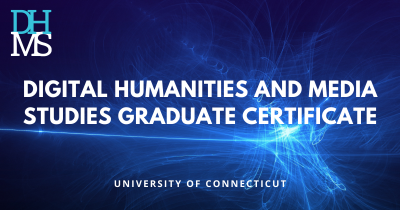 The Graduate Certificate in Digital Humanities and Media Studies (DHMS) provides graduate students with essential training for their careers inside and outside academia. The UConn Graduate Certificate in Digital Humanities and Media Studies is unique insofar as it is fundamentally interdisciplinary in its approach: it is oriented towards digital humanities methods, research, and practice, and it integrates media studies as an interdisciplinary and international field of critical media theory and cultural studies.
The Graduate Certificate in Digital Humanities and Media Studies (DHMS) provides graduate students with essential training for their careers inside and outside academia. The UConn Graduate Certificate in Digital Humanities and Media Studies is unique insofar as it is fundamentally interdisciplinary in its approach: it is oriented towards digital humanities methods, research, and practice, and it integrates media studies as an interdisciplinary and international field of critical media theory and cultural studies.
Objectives
The Graduate Certificate in DHMS is administered by the Humanities Institute, under the directorship of Anke Finger. The certificate prepares students to conduct research with digital tools by gaining and supplying knowledge about same tools, about methods, and about theoretical issues central to the numerous and rich interfaces between digital humanities and media studies. These may include distant reading/text mining, data visualization, geo-spatial inquiries and mapping, multimedia or digital storytelling, information or knowledge design, and network analysis in combination with the history of media, media archeology, media aesthetics, media theory, media philosophy, electronic literature, digital cultures and game studies. More generally, the DHMS certificate also integrates with developments in digital, multimodal, and open scholarship in a variety of humanities and social science disciplines. Each plan of study is unique, and your interests and suggestions are central to designing your very own certificate curriculum within this program. There is no firm deadline, apply whenever you are ready, following the schedule provided by the Graduate School.
Outcomes:
- a DHMS Portfolio for career purposes (see requirements below)
- a workable and theoretically sound understanding of the interface between Digital Humanities and Media Studies
- a practical and theoretical understanding of thehumanities, social sciences and the arts in the digital age as they apply to sectors within and beyond the academy
- an understanding of and experience with collaborative practices in the humanities, social sciences, and the arts as such practices apply to research, teaching and working with digital tools and approaches
Certificate Requirements (12 credits)
The Graduate Certificate in DHMS for graduate students enrolled in CLAS or Fine Arts PhD or MA/MFA programs will require a total of 12 credits:
- 3 credits in one of the core courses,
- three 3-credit electives that may overlap with other required courses
Certificate core courses do not require any pre-requisites. Graduate students applying to the Certificate program must be full-time students with a GPA of 3.0 or higher. Students not currently enrolled in MA/MFA or PhD programs at UConn are welcome—DHMS is a stand-alone program. Each of the core courses introduces students to key aspects of digital humanities within the context of media studies and digital cultures.
Students may take courses concurrently as they complete their MA/MFA or PhD. The three electives will allow students to branch out into the various subfields or sister fields of digital humanities and media studies while they may also cover credits required by the home department – choices to be determined with the advisor(s). At least one core course will be offered every year.
Core Courses (students take one, 3 credits)
ENGL 5650: Digital Humanities I
LCL 5020: Digital Humanities, Media Studies, and Multimodal Scholarship (offered Spring 2025)
DMD 5610: Introduction to Digital Humanities
Electives
Electives should be chosen based on the student’s major field of inquiry, their departmental home, and their dissertation or thesis research (if applicable), in consultation with the student’s PhD or MA/MFA advisor and the Director of the DHMS certificate. These courses can overlap with the requirements in the home department. Sharing transcripts with the DHMS Director will help determine if courses taken in the past or currently already qualify to be counted towards the certificate!
Possible courses include (the list below is merely a sampling):
COMM 5660 Computer Mediated Communication
COMM 5650 Communication Technology and Society
CSE 5302 Computer Architecture
DMD 5220 Cinematic Storytelling
ENGL 6650 Seminar in Digital Humanities
GEOG 5500 Fundamentals of Geographic Information Systems
GERM 5365 German Film Studies
LING 5000 Introduction to Computational Linguistics
Please check the graduate catalog and departmental postings about upcoming seminars or courses that may fulfill the requirements and content for DHMS course work.
DHMS Portfolio
The DHMS Portfolio serves as a capstone project and is culled from work accomplished over the course of working on the DHMS Graduate Certificate. Encouraged are projects that advance the student’s overall career portfolio and/or are part of the dissertation or MA thesis research. Students should be able to communicate the intellectual rigor and theoretical foundations of their work, no matter which medium/media they choose for the final product (graduates have generated a variety of projects ranging from animated shorts to multimodal projects on Scalar to quantitative work contributing to fan studies). Some of the links and materials available on the DHMS Resources page will help provide guidance for developing your own portfolio.
To Apply
Please submit a statement of purpose (300-500 words) to the director of the DHMS graduate certificate, Anke Finger (anke.finger@uconn.edu). What are your goals and interests related to DHMS? How does the DHMS certificate integrate with your research, teaching, career plans? A Plan of Study for Certificate Programs is available from the Graduate School. You apply with the Grad School to be admitted to the certificate program (Graduate School deadlines apply). When all requirements, including the DHMS portfolio, have been completed, the Certificate will be issued.
Links for further information
The Association for Computers and the Humanities
Virginia Kuhn and Anke Finger, eds. Shaping the Digital Dissertation. Knowledge Production in the Arts and Humanities (2021)
Abigail E. Mann and Micah Vandegrift, Immersive Scholar: A Guidebook for Documenting and Publishing Experiential Scholarship Works (2021)
Debates in the Digital Humanities, 2012 – present.
Guidelines for Evaluating Digital Scholarship (MLA, 2024)